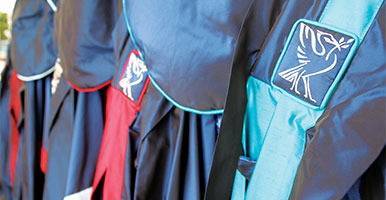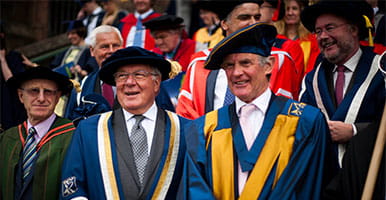Dr David Flavell
Presented by Steve Kenny
Honourable Chancellor, I have pleasure in presenting Dr David Flavell for the award of an Honorary Fellowship from Liverpool John Moores University.
This is a truly civic university, firmly rooted in this extraordinary city, and its defining ethos comprises three deceptively simple yet very powerful words: dream, plan, achieve.
Each July during Graduation Week, the University's highest honour – an Honorary Fellowship – is bestowed on a select band of individuals outside the University, in recognition of their outstanding achievement in a given field or profession, and who personify and inspire others to 'dream, plan, and achieve.'
Dr David Flavell is Scientific Director of Leukaemia Busters, a charity he co-founded in 1989 to support children and adults who have been diagnosed with leukaemia and lymphoma, and to conduct research programmes into new antibody-based treatments.
We propose David today for his outstanding contribution to cancer research during a research career spanning 38 years.
Born in Southport in 1953, David studied Applied Biology at Liverpool Polytechnic, graduating in 1975.
Having developed an early interest in cancer immunology, he went on to gain his doctorate at the University of Sheffield Medical School and a post-doctoral Wellcome Trust Fellowship that allowed him to conduct cancer-related parasitology research at Bangkok's largest teaching hospital.
He returned to England in 1979 to continue his research at the London School of Hygiene and Tropical Medicine, alongside his wife Bee. They had met as PhD students in Sheffield through complementary research interests, and have since worked together almost continuously as research collaborators.
A senior postdoctoral research opportunity arose at the University of Southampton Medical School in early 1984, allowing David to work first in the Tenovus Research Laboratories and then to establish a monoclonal antibody laboratory in Professor Dennis Wright's University Department of Pathology at Southampton General Hospital.
Bee's work in the University Department of Haematology at the same Medical School resulted in significant opportunities for collaboration, and as a result, many individual monoclonal antibodies of value in diagnosis of haematological malignancies were produced by David and Bee between 1984 and 1988. Leukaemia Busters was founded in 1989 by David, Bee and two other parents, all of whom had young sons being treated for T-cell leukaemia or lymphoma at Southampton General Hospital.
Today, the charity's research programmes are conducted in the Simon Flavell Leukaemia Research Laboratory based at the hospital, a living memorial to the ten-year-old son David and Bee lost to an aggressive form of childhood leukaemia in 1990. The formation of Leukaemia Busters enabled David to move his diagnostic antibody work into treatment.
David continued to work as honorary Scientific Director for Leukaemia Busters while still employed by the University of Southampton until 2005, when he transferred full time to Leukaemia Busters as the charity's Scientific Director.
Under his direction several antibody-based drugs that selectively kill leukaemia, lymphoma and myeloma cells were developed, two of which have been tested in patients participating in three separate early phase clinical trials. David was largely responsible for the first national clinical trial of an antibody-based treatment in children with relapsed leukaemia that took place between 2001 and 2003.
Most recently, a collaborative research study with researchers at the Charité University in Berlin, Europe's largest teaching hospital, has made a breakthrough discovery. It was found that molecules called saponins, extracted from the Gypsophila paniculata plant commonly known as Baby's Breath, increase the potency of immunotoxin treatment by tens of thousand-fold for certain types of leukaemia and lymphoma.
This is potentially a very important discovery that could lead to the destruction of leukaemia cells in the patient much more effectively with much lower doses of immunotoxin. The breakthrough work is currently being published and was presented to the global cancer research community at the American Association for Cancer Research Annual Meeting in Washington DC in 2011. This is the largest cancer research meeting in the world that brings together 20,000 researchers from around the globe.
David has authored numerous original scientific papers and book chapters and regularly presents his work at international conferences worldwide. He has been a member of the American Association for Cancer Research since 1993 and a member of the American Society of Hematology since 1997.
In 1996 David became a Member of the Royal College of Pathologists on the strength of his research work, and in 2003 was made a Fellow.
Leukaemia Busters relies on public donations, an exceptionally effective fundraising programme and the support of high-profile patrons including Gary Lineker, Harry Redknapp and David Gower to fund its research agenda, and can demonstrate 24 years of unbroken research in support of its mission.
Its dream is a world in which leukaemia is safely, quickly and completely cured.
It plans to achieve this by funding and conducting high-quality, independently peer-reviewed research with national and international research partners, and taking any promising antibody-based treatments that are developed through rigorous testing and clinical trials.
Its achievement is testimony to the strength of the human spirit that David, and Bee, has been able to turn great personal loss into something that has created hope and promises to extend life for many others.
Thus, it is with great pleasure that I present Dr. David Flavell, this most distinguished son of our region, for admission as an Honorary Fellow of Liverpool John Moores University.




